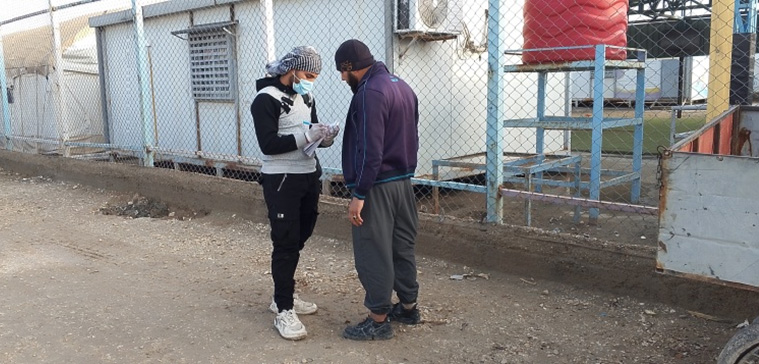 Abdulsalam Al-Ali, a WHO- trained local community health volunteer communicates health messages to individuals and households.10 March 2025 – Overcrowding, unsafe sanitation, restricted movement and limited access to secondary health care all contribute to the significant public health challenges faced by more than 42 000 refugees and internally displaced individuals living at Al-Hol Camp in northeast Syria.
Abdulsalam Al-Ali, a WHO- trained local community health volunteer communicates health messages to individuals and households.10 March 2025 – Overcrowding, unsafe sanitation, restricted movement and limited access to secondary health care all contribute to the significant public health challenges faced by more than 42 000 refugees and internally displaced individuals living at Al-Hol Camp in northeast Syria.
Conditions have led to repeated outbreaks of infectious diseases, placing immense strain on medical services and public health surveillance. The resurgence of cholera in 2024 underscored the urgent need to enhance surveillance and early detection systems.
In response to the outbreak, the World Health Organization (WHO), in collaboration with local health partners, launched a community-based initiative aimed at strengthening disease surveillance within the camp. Starting on 15 November 2024, WHO began integrating community-based surveillance (CBS) into the existing Early Warning, Alert and Response System (EWARS), enabling the rapid detection and reporting of diseases like acute watery diarrhea (AWD) through community channels.
The initiative focused on training and empowering local community health volunteers (CHVs) to identify priority diseases, refer cases to health facilities, contact trace and report disease surveillance information to the camp health authorities. CHVs played a pivotal role during the outbreak by collecting data on AWD and other illnesses and ensuring the timely reporting of health information to local health facilities for quick action. CHVs also conducted community engagement sessions with individuals and households to raise awareness about the risks of waterborne diseases and the importance of seeking health care early, and the role of oral rehydration solution (ORS) in home treatment of mild cases of diarrhoea.
CHV Huda Mahmoud Hamdan said the main goal of her participation was to help the people she lives with. Her task was made easier by the trust people in the camp have in her. She is well known and lives beside them in the same area of the camp. Being well-regarded by neighbours means people are more accepting of her health messages.
As he underlined how his team was offering essential services to people in desperate need, CHV Abdulsalam Al-Ali said the training provided by WHO had greatly improved the ability of volunteers to effectively communicate health messages to individuals and households.
The CBS initiative has proven effective in early disease detection. Since the initiative began, 294 health alerts have been generated, including 123 suspected AWD cases, 96 tuberculosis cases and 62 suspected cases of hepatitis A.
The alerts triggered swift responses from health partners, enabling timely interventions. CHVs played a crucial role in facilitating these faster response times by ensuring the prompt collection of samples for laboratory delivery, providing ORS and referring patients to health facilities for treatment.
The work done in Al-Hol Camp highlights the effectiveness of community-driven surveillance in strengthening public health systems during crises. By empowering local volunteers to improve disease monitoring, the initiative has been pivotal in protecting the health of camp residents. The spread of cholera in Al Hol Camp was more rapidly controlled due to the timely detection of cases at community level and improved hygiene practices – both of which were made possible by the committed efforts of CHVs. Expanding CBS to other high-risk areas will help ensure more effective health interventions and bolster the overall public health response across the Syrian Arab Republic.


